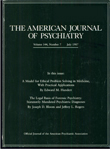Differences between forensic and general psychiatry
Abstract
There are important differences between general and forensic psychiatry. In forensic psychiatry the psychiatrist serves a third party rather than the patient; both the patient and the psychiatrist must understand this to avoid misrepresenting the doctor's role to the patient and to enable the doctor to adequately serve the law. Psychiatric opinions that are useful for treatment may not be useful in determining whether a person can be considered responsible or competent. In forensic work the psychiatrist's role is not that of a therapist; it is that of an evaluator and an opinion giver but not a decision maker.
Access content
To read the fulltext, please use one of the options below to sign in or purchase access.- Personal login
- Institutional Login
- Sign in via OpenAthens
- Register for access
-
Please login/register if you wish to pair your device and check access availability.
Not a subscriber?
PsychiatryOnline subscription options offer access to the DSM-5 library, books, journals, CME, and patient resources. This all-in-one virtual library provides psychiatrists and mental health professionals with key resources for diagnosis, treatment, research, and professional development.
Need more help? PsychiatryOnline Customer Service may be reached by emailing [email protected] or by calling 800-368-5777 (in the U.S.) or 703-907-7322 (outside the U.S.).



